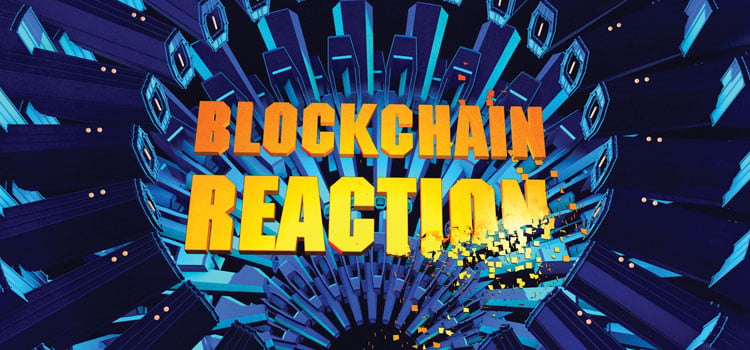The game-changing technology underpinning crypto-currencies such as bitcoin threatens to supersede lawyers and other trusted intermediaries.

The game-changing technology underpinning crypto-currencies such as bitcoin threatens to supersede lawyers and other trusted intermediaries.
Late last year, English online property sales site clicktopurchase.com made news by completing the sale of a residential property only three days after it hit the market.
Yet that wasn’t the only unusual aspect of the approximately $1-million sale. Enabled by a blockchain-based shared ledger that recorded the deal’s details, the transaction itself reportedly took place in less than four seconds — and all without the need for a title search, land survey vetting or verification of tax records.
In other words, it happened without a lawyer.
After closing the deal, a clicktopurchase.com spokesperson predicted blockchain would bring to property transactions more speed, ease, certainty and efficiency by “removing intermediaries” (aka middlemen) from the process.
Around the same time, Sweden’s land registry authority announced it was using blockchain to cut to a few days from four months the time that passes between writing a purchasing contract to registering change of ownership. (Initial results appear promising.) Then, a month later, Dubai’s land department claimed it had become the world’s first government agency to carry out all property transactions with blockchain.
As Toronto lawyer and blockchain expert Amy ter Haar puts it, “For the first time, mere mortals have used clever code to manufacture trust . . . With blockchain, the trust train is moving to a new place.”
Aaron Grinhaus runs Grinhaus Law, a full-service mid-town Toronto boutique business law firm that provides daily tax and securities advice on blockchain-related initial crypto-currency coin and token offers (referred to as ICOs and ITOs). He also helps clients structure crypto-mining operations, advises crypto-investment companies and helps structure asset holdings of high-net-worth crypto investors and traders.
Grinhaus believes lawyers “should be scared” by blockchain. It will “hit the profession hard,” he predicts, rendering many legal services — including secured and commercial transaction, real estate registration and dispute resolution — “obsolete.”
“I got into this a few years back, when I saw I needed to get ahead of blockchain before it got ahead of me and put me out of a job,” jokes Grinhaus.
Omar Soliman, a Toronto corporate lawyer with Stikeman Elliott LLP, agrees about the risks to the profession from blockchain. Soliman, who has been advising blockchain startups since 2015, says the technology means that, “suddenly, the people whom we currently pay to facilitate trust in commercial transactions — the clearing agencies, custodians and depositories, all of the existing infrastructure [that] is used to settle securities — are beginning to look a bit ancient and costly.”
Given the likely disruption and challenges on the horizon, maybe the profession’s best bet is to simply hide under a desk and hope the current hype around blockchain turns out to be just another Y2K?
Or, like Grinhaus and Soliman — and an already sizeable and seemingly fast-growing group of Canadian commercial lawyers — legal service providers could instead start making money out of blockchain’s significant potential for increasing legal ambiguity and uncertainty.
Take, for example, blockchain-enabled smart contracts that self execute without the involvement of contracting parties. Do traditional contract concepts apply or is a re-examination of Canadian contract law required? Then there’s the seemingly fast-burgeoning raft of legal issues around blockchain and Canadian and international intellectual property, securities and data privacy law. (Immutable personal records, anyone?)
Jennifer Farrell, an assistant law professor at Ontario’s Western University, says that, for regulators at least, blockchain is a double-edged sword.
“On the one hand, blockchain could enhance many regulatory and legal procedures — for example, fighting fraud, ID theft [and] human trafficking or securing supply chains. But, on the other hand, it drives crypto-currencies — and crypto-currencies are inherently creating substantial regulatory and legal concerns for governments.
“It’s a Jekyll and Hyde situation.”
Then there’s tax, says Farrell.
“While blockchain may eliminate tax fraud and evasion, collect taxes in real time, eliminate annual tax returns, reduce compliance costs for business and government and help transform an outdated international system, crypto-currencies and blockchain are at the same time a perfect ecosystem for evasion and laundering.”
Farrell says he also wonders if regulators will classify crypto as currencies, securities or commodities.
“There’s no consensus. For crypto investors who want to comply with the laws — and in my experience, the vast majority do — there are very simple practical problems with compliance. For example, where does one place crypto gains or losses on a tax return?”
Grinhaus says blockchain also poses problems when it comes to enforcing regulations that impact transactions involving crypto-graphic assets — assets that can be transferred anonymously worldwide.
“Although the U.S. is still struggling with these same issues, its regulators and courts have been far more active in interpreting and enforcing the existing rules,” he says.
For Soliman, at least, all this ambiguity means the firm is currently “almost non-stop on private placements, reverse takeovers and ICOs involving blockchain companies — not to mention countless other general commercial mandates for crypto-miners, custodians, major financial institutions and so on.”
Another Canadian firm reportedly capitalizing on blockchain is Gowlings WLG, where Usman Sheikh heads up a dedicated blockchain and smart contracts group. Sources say that boutiques to one side, Gowlings leads on blockchain instructions among Canada’s biggest firms. In February, Gowlings announced a “strategic alliance” with four-year-old Toronto-based company Decentral, Canada’s foremost blockchain company. As part of the agreement, Decentral is helping Gowlings “develop its internal blockchain infrastructure and client-facing tools,” a release said, while Gowlings is guiding the legal aspects of Decentral’s practices and projects.
Fasken Martineau DuMoulin LLP, meanwhile, has also signed up to a group — the Global Legal Blockchain Consortium, a non-profit aiming to lead standards and governance for the adoption of blockchain within legal services. A spokesperson said that, as of late March, Fasken had advised “many” blockchain startups on ICOs, helped a lot of asset managers offer crypto-currency management services and products and led financings for crypto-currency exchange Coinsquare.
Dentons, another GLBC member, told Canadian Lawyer that the firm has been busy advising on blockchain issues ranging from ICOs to foreign exchange payment solutions to startups wanting to run crypto-currency exchanges out of Canada. Others, apparently busy with blockchain, include Miller Thomson LLP, McCarthy Tétrault LLP, Aird & Berlis LLP, Osler Hoskin & Harcourt LLP, Montreal-based BCF Business Law and Bennett Jones. The latter is a member of the Enterprise Ethereum Alliance, a crypto-currency focused non-profit that has attracted approximately a quarter of the world’s 100 largest law firms, a spokesperson told Canadian Lawyer.
But besides boutiques, big firms and hourly billings, North American lawyers (including many Canadians) are using blockchain to build businesses that cut cost and errors out of legal service delivery.
For example, internet-based firms Loci InnVenn and OpenLaw, respectively, allow inventors to improve time stamping of intellectual property claims and lawyers to automatically generate legal agreements and embed smart contracts that can be executed on blockchain.
A third company, Integra Ledger (where ter Haar is president of the Canadian operation), provides a permissioned blockchain to increase the integrity of legal documents.
Also on the board of Blockchain Canada and the Blockchain Hub, ter Haar teaches tech law via Osgoode Hall’s professional development program and co-runs legal hacking events in Toronto and London, Ont.
She told Canadian Lawyer that Integra Ledger will provide the legal industry with a standardized and secure platform allowing hundreds of existing and future legal tech software companies to “seamlessly connect and deliver their apps to a much larger universe of law firms, corporate clients and individual clients” — while also cutting cost and complexity.
Says ter Haar, “Blockchain, combined with modern cryptography, offers the possibility of authoritative systems of record that are securely shared between firms and clients. Integral’s goal is a universal backbone and technology platform that empowers firms and clients to interact and inter-operate with much greater efficiency and security. We see a blockchain that all firms and clients can use to manage communications, documents and agreements among themselves in a secure, consistent, reliable and private manner.”
Then there’s blockchain’s potential for improving law firms’ internal operations. For example, international firm K&L Gates is trying to use blockchain to improve how it manages HR-related and other internal information, as well as deal documents.
Even bigger picture-wise, blockchain may even improve lawyer morale, speculates Toronto litigator and computer programmer Pulat Yunusov.
“For lawyers, blockchain offers liberation from routine and basic contract work and from trivial cases that waste lawyers’ enormous creative human potential on what machines can do well enough. Blockchain will automate aspects of evidence and dispute resolution, and free lawyers up to focus on truly controversial cases that actually advance the law,” Yunusov says.
Furthermore, the technology may offer Canada’s lawyers a chance to lead globally. Toronto-based Addison Cameron-Huff is Decentral’s president and a programmer who has worked in the blockchain industry as a lawyer since 2014. Before joining Decentral, he ran a law practice that started accepting Bitcoin in 2014 and advised clients such as Bitcoin core developer Peter Todd as well as Anthony Diiorio, co-founder of Ethereum, Bitcoin’s main rival. Cameron-Huff is also an adjunct professor at the University of Toronto’s law school (where he teaches a course on crypto), and he has written about it frequently including for Nasdaq.com and Bitcoin Magazine. He says Toronto is already a recognized world centre for crypto, blockchain and distributed ledger tech.
Says Cameron-Huff, “Toronto has hundreds of accountants and lawyers who work on blockchain matters — the start of a cluster . . . Canada is well connected internationally, and almost all ‘crypto projects’ are by default global, rather than local — so our small local market isn’t an issue.
“The regulatory environment is also a factor. Canadian money services business rules and our forward-thinking securities regulators have been helpful for the industry’s growth. But probably the most significant factor was the rise of Ethereum in Toronto and the many blockchain investors that came from that, similar to Silicon Valley’s venture capital tech ecosystem.”
Adds ter Haar, “When it comes to legal tech, Toronto takes top place globally . . . Canadian firms have been leading the legal blockchain consortium. The largest law firm in the world, Dentons, signed up through its Canadian office.”
Grinhaus says that whenever he travels to international blockchain events, “there’s always a disproportionately large Canadian contingent.
“I’m very proud when I see that. We are a very progressive, forward-thinking society and the principles upon which blockchain is based — freedom, security, democracy, accessibility — are inherently very Canadian,” says Grinhaus.
Dentons lawyer Tracy Molino says Canada’s regulatory regime is “increasingly seen by investors as more stable or easier to predict” than that in the U.S.
“Investors consider Canadian regulators relatively open to working with new technology, from a securities perspective,” says Molino.
However, Canadian firms will have to close a “four- or five-year gap” between them and U.K. and U.S. competitors, says one insider, while global legal directories don’t currently rank any Canadians among the best blockchain lawyers (yes, there’s a category for that now). People close to the matter say U.S. firms such as Perkins Coie LLP, Davis Polk & Wardwell LLP, Morrison & Foerster LLP and Cooley LLP dominate Canadian firms on blockchain.
Blockchain is still in its infancy — fragmented and lacking common standards or standardized processes. Nonetheless, Farrell urges law schools to respond now.
“Currently, some lawyers don’t understand blockchain and Bitcoin are different things,” she says.
But will lawyers have to learn code? Definitely not, says Yunusov. “Let’s put that notion to rest already. Lawyers will have enough work as it is.”
What is blockchain anyway?
In 2015, The Economist dubbed blockchain the “trust machine,” saying it “lets people who have no particular confidence in each other collaborate without having to go through a neutral central authority.”
In a blockchain, no single entity or party controls data or information. Instead, all participants collectively keep the ledger up to date. Similarly, each party to a transaction can individually access the entire database including the complete history of a transaction and can also verify the records of its transaction partners — without going through an intermediary such as a lawyer. Additionally, there is no loss of records in case of a crash, as the ledger is distributed among different participants and computers on the network. This is called distributed ledger technology — or blockchain. As soon as a transaction is entered into, the blockchain and the accounts are updated. A record cannot be altered because it is linked to every transaction record that came before it. The records are irreversible through the deployment of complex computational algorithms that ensure that records are permanent, chronologically ordered and available to all others on the network. If a party wishes to alter the record, it must pass a new entry that will be added to the old block, and this will be evident to all participants. This ensures the transaction is immutable. All communication in a blockchain occurs directly between peers instead of through a central node. Each node stores and forwards information to all other nodes (peer-to-peer transmission). The digital nature of the ledger means that blockchain transactions can be tied to computational logic and programmed. Hence, users can set up algorithms and rules that automatically trigger transactions between nodes. (This enables smart contracts.) Finally, every transaction and its associated value is visible to anyone with access to the system.
Cue the “trust economy.”
Blockchain goes global
According to Coinschedule, new crypto-currency offerings raised more than $3.4 billion in 2017 — and they had, as of late February, raised a further $2 billion this year.
Last August, six of the world’s largest banks began working together on a new form of digital cash for clearing and settling financial transactions over blockchain.
Japan accepts Bitcoin as legal tender – unlike Bangladesh, where for anti-laundering reasons, using crypto-currency is illegal.
In Europe, Luxembourg’s government has begun developing a blockchain-based identity platform it hopes to use in everything from tax filing to regulatory enforcement, while insurance giant AXA has announced “self-executing” contracts based on blockchain technology capable of automatically compensating customers for delayed flights. And business advisory giant EY has announced a blockchain-based platform for global shipping insurers that aims to connect clients, brokers, insurers and third parties to distributed common ledgers that capture data about identities, risk and exposures and automatically feed it into contracts.
In the U.S., Delaware has changed its corporate laws to enable blockchains for share registries, Vermont has admitted blockchain-based records as court evidence and Arizona reportedly acknowledges the legality of signatures and contracts secured on blockchain.
Here in Canada, the Canadian Stock Exchange (an alternative stock exchange) wants to record stock purchases and sales via a blockchain. In late March, the TMX Group said its subsidiary Shorcan Digital Currency Network was working with Paycase Financial, a Toronto-based value network and trustware provider for decentralized financial services to launch a new crypto-currency brokerage service focused on Bitcoin and Ether. BMO Financial Group will provide Shorcan DCN with banking services as part of the payment and settlement infrastructure. At the same time, the Ontario Securities Commission is using its “Launchpad” project to explore the technology. Meanwhile, Payments Canada’s Project Jasper has seen Ottawa work with several Canadian banks to explore how the Large Value Transfer System could transition to blockchain.
Read up
Anyone keen to get grounded in blockchain and the law can attend community events such as Toronto Legal Hackers, Blockchain Canada or various bitcoin blockchain meetups to discover what entrepreneurs are building.
Online, the better sources are Bitcoin Magazine, CoinDesk,
Cointelegraph, distributed.com, dealbook.nytimes.com (search for content),
the blog.ethereum.org, then Twitter, Reddit and LinkedIn Collections.
Further reading
Blockchain and the Law: The Rule of Code, by Aaron Wright and Primavera De Filippi
Blockchain Revolution: How the Technology behind Bitcoin Is Changing Money, Business, and the World , by Alex Tapscott and Don Tapscott
The Business Blockchain: Promise, Practice, and Application of the Next Internet Technology , by William Mougayar
Blockchain for Beginners: Guide to Understanding the Foundation and Basics of the Revolutionary Blockchain Technology, by Scott Marks
Blockchain: Ultimate guide to understanding blockchain, bitcoin, cryptocurrencies, smart contracts and the future of money , by Mark Gates
ethereum: blockchains, digital assets, smart contracts, decentralized autonomous organizations, by Henning Diedrich










